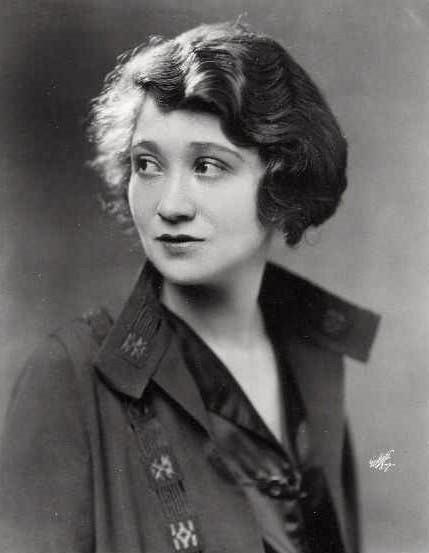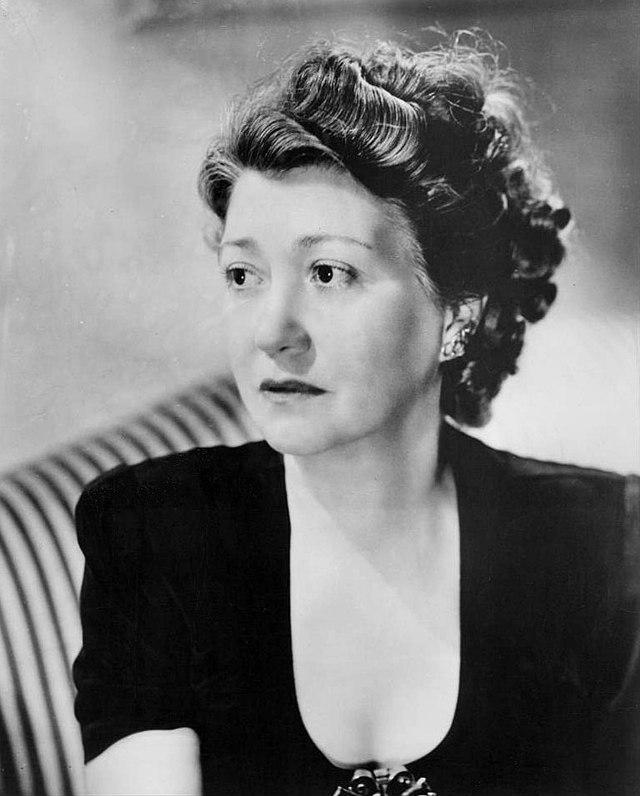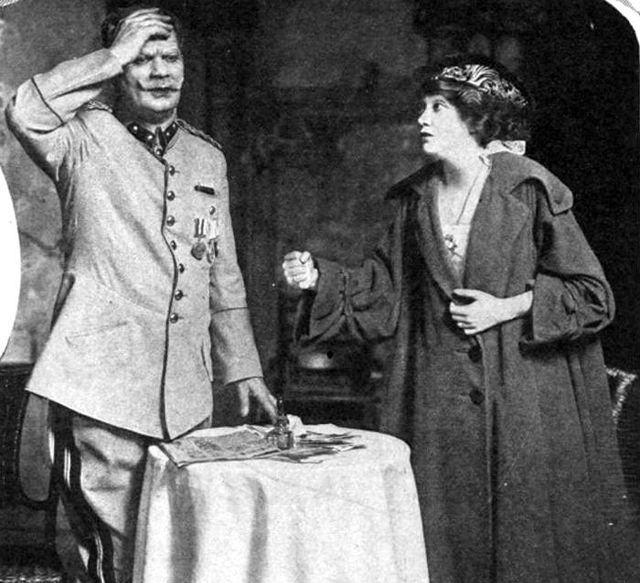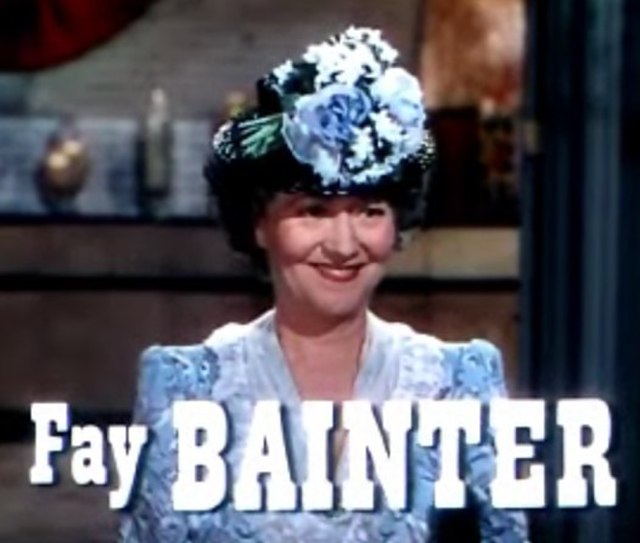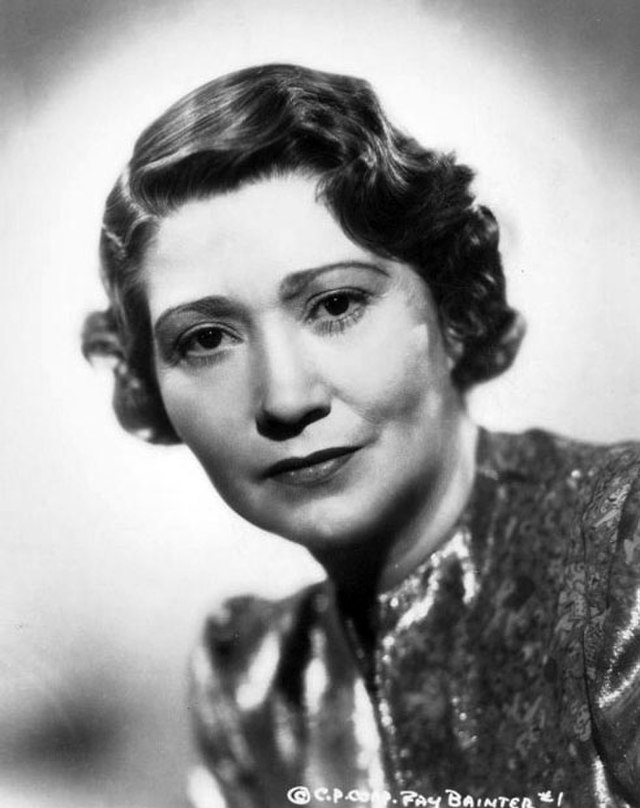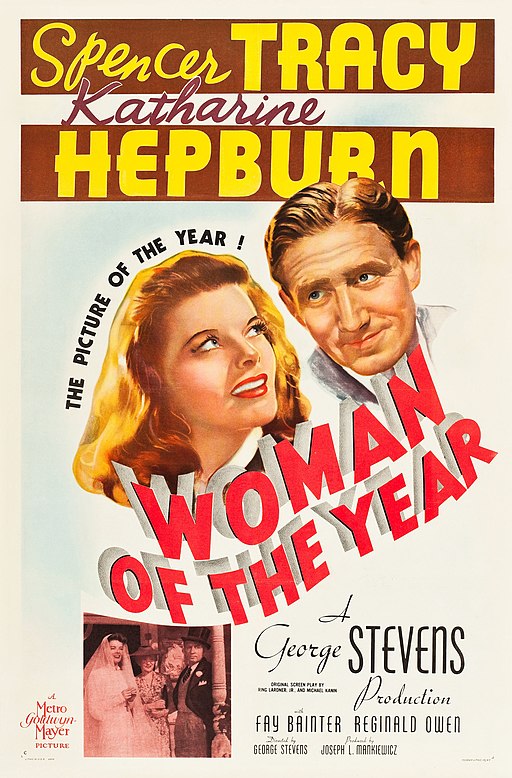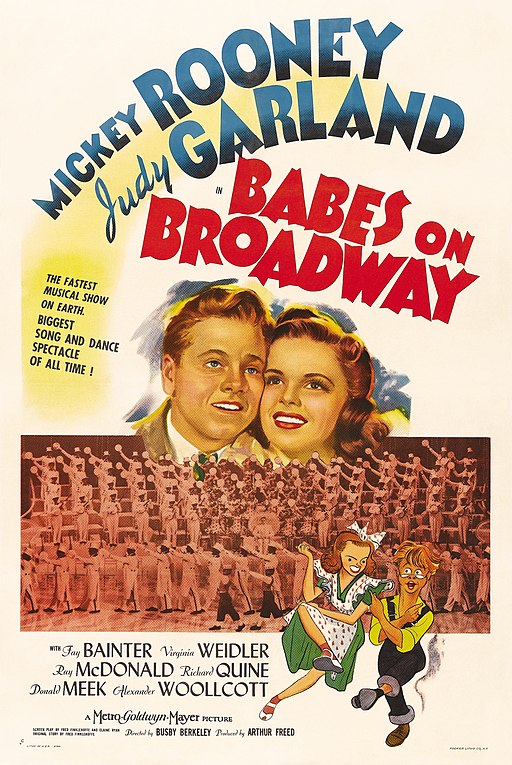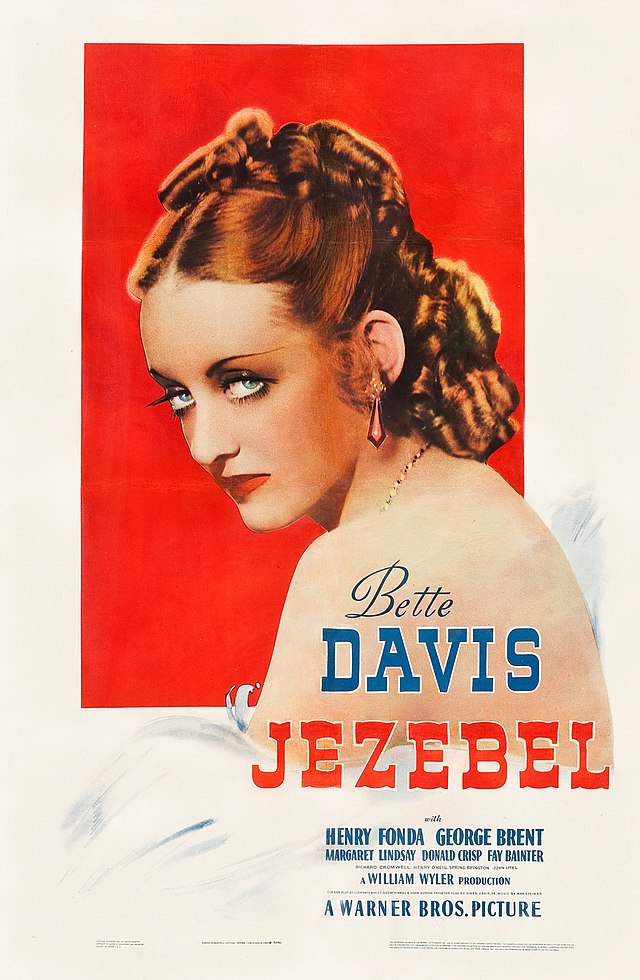Fay Bainter
back| Full Name | Fay Okell Bainter |
| Stage Name | Fay Bainter |
| Born | December 7, 1893 |
| Birthplace | Los Angeles, California, USA |
| Died | April 16, 1968 |
| Buried | Arlington National Cemetery, Arlington, Virginia, USA |
| Married to | Reginald Venable (married from 1921 until his death in 1964) |
| Children | Reginald Venable Jr. |
| Notable films | Jezebel (1938) - White Banners (1938) - The Children's Hour (1961) - State Fair (1945) - The Secret Life of Walter Mitty (1947) |
Fay Bainter
The Grand Dame of Character Acting
Fay Bainter (1893-1968) was a celebrated American actress known for her nuanced performances in both film and theater.
Bainter made history in 1939 by receiving dual Academy Award nominations, winning Best Supporting Actress for Jezebel and earning a Best Actress nod for White Banners. Renowned for her emotional depth and authenticity, she excelled in versatile roles, including standout performances in The Children's Hour and State Fair.
Related
Fay Bainter
Biography and Career Overview
Fay Okell Bainter was born on December 7, 1893, in Los Angeles, California. She began her acting career on the stage, making her Broadway debut in 1912 in the play The Rose of Panama. Over the next two decades, she established herself as a talented and versatile actress in the theater.
In 1934, Bainter made her film debut in This Side of Heaven, and she quickly became a respected and sought-after character actress in Hollywood. Her breakthrough role came in 1938 when she starred in Jezebel alongside Bette Davis. Bainter's portrayal of Aunt Belle earned her the Academy Award for Best Supporting Actress, making her one of the few actors to win an Oscar for their first nominated performance.
In the same year, Bainter delivered a powerful performance in White Banners, for which she received an Academy Award nomination for Best Actress. This dual recognition in a single year solidified her reputation as a distinguished actress capable of bringing depth and nuance to her roles.
Throughout her career, Bainter was known for her ability to portray a wide range of characters, from loving and nurturing mothers to stern and authoritative figures. She appeared in many significant films during the 1930s and 1940s, including The War Against Mrs. Hadley (1942) and Claudia (1943).
In the 1950s and 1960s, Bainter continued to work in film and television, adapting to the changing landscape of the entertainment industry. Her performance in The Children's Hour (1961) was particularly notable, as she played a pivotal role in this drama that tackled complex social issues.
Bainter was married to Reginald Venable, an officer in the United States Navy, from 1921 until his death in 1964. They had one son, Reginald Venable Jr., who also served in the military.
Fay Bainter passed away on April 16, 1968, in Los Angeles, California. She was laid to rest in Arlington National Cemetery, a testament to her family's military connections. Her legacy endures through her memorable performances and her contributions to both stage and screen.
Short Video on Fay Bainter:
Nuanced Acting Style of Fain Bainter:
Fay Bainter's acting style is marked by its nuanced subtlety, emotional depth, and a strong sense of authenticity. Her performances often conveyed a deep understanding of her characters' inner lives, bringing a richness and realism to her roles that resonated with audiences and critics alike.
Subtle Emotional Expressiveness:
Bainter had a remarkable ability to express complex emotions with subtle facial expressions and body language. Instead of relying on overt dramatics, she often conveyed a character's feelings through a slight shift in her eyes, a softening of her voice, or a delicate gesture. This subtlety made her performances feel genuine and deeply human.
Versatility and Range:
Throughout her career, Bainter demonstrated a wide range of acting abilities, adeptly shifting between genres and character types. Whether she was playing a nurturing mother, a stern authority figure, or a compassionate friend, Bainter brought a unique and convincing presence to each role. This versatility allowed her to excel in both supporting and leading roles, in dramas, comedies, and period pieces.
Naturalism and Authenticity:
Bainter's acting style leaned towards naturalism, prioritizing believable and authentic portrayals over theatricality. Her performances were grounded in a realistic approach that made her characters relatable and credible. She often infused her roles with a sense of lived experience, making it easy for audiences to connect with her characters on a personal level.
Strong Character Interpretations:
Bainter was known for her strong character interpretations, providing depth and complexity to her roles. She often played women who were wise, resilient, and compassionate, bringing a sense of dignity and strength to her performances. Her characters were often multi-dimensional, reflecting the complexities of real people rather than one-dimensional stereotypes.
Commanding Screen Presence:
Despite her subtle approach, Bainter had a commanding screen presence that drew viewers' attention. Her ability to dominate a scene without overshadowing her co-stars is a testament to her skill as an actress. She could hold her own alongside major stars of her time, contributing significantly to the overall impact of the films she was in.
Mastery of Supporting Roles:
While she excelled in leading roles, Bainter's true mastery often shone in her supporting roles. She had a talent for enhancing the performances of those around her, adding layers to the story and enriching the film's narrative. Her supporting characters often provided crucial emotional support and narrative depth, making her an invaluable asset to any cast.
Vocal Expressiveness:
Bainter's voice was a powerful tool in her acting arsenal. She used her vocal range to convey a wide spectrum of emotions, from tenderness and warmth to authority and firmness. Her vocal expressiveness added another layer to her performances, making her characters' emotional journeys even more compelling.
Timeless Appeal:
Bainter's acting style has a timeless appeal, resonating with audiences even today. Her ability to portray timeless human emotions and situations with authenticity and grace ensures that her performances remain impactful and relevant.
Notable Quotes:
On Acting:
"An actor should be able to create the universe in the palm of his hand."
On Her Career:
"I've been very fortunate in my career to have had the opportunity to play a variety of roles, each one a different window into the human experience."
On Life:
"Life is a series of performances, each one demanding its own unique preparation and understanding."
On Her Craft:
"To truly inhabit a character, one must not just learn the lines, but understand the soul behind them."
On Success:
"Success in acting comes not from seeking fame, but from a relentless pursuit of truth and authenticity in every role."
What Others said about Fay Bainter:
ay Bainter was widely respected and admired by her peers, critics, and audiences. Here are some notable remarks from others about her:
Peers and Colleagues:
Bette Davis:
"Fay Bainter brought a depth and humanity to her roles that was both inspiring and humbling. She was a true artist and a pleasure to work with."
Director William Wyler:
"Fay had an uncanny ability to make every role her own, bringing a richness and subtlety that elevated the entire production. She was a director's dream."
Actress Teresa Wright:
"Working with Fay Bainter was a masterclass in acting. Her dedication to her craft and her ability to find truth in every scene was truly remarkable."
Critics:
Bosley Crowther, The New York Times:
"Fay Bainter possesses an extraordinary gift for conveying the complexities of human emotion with remarkable subtlety. Her performances are always a highlight, bringing a sense of authenticity and gravitas to the screen."
Variety Magazine:
"Bainter's performances are marked by a profound emotional depth and a naturalistic approach that sets her apart from her contemporaries. She has an exceptional talent for making the ordinary extraordinary."
Pauline Kael, Film Critic:
"Fay Bainter's presence in any film is a guarantee of quality. Her ability to inhabit her characters so fully and convincingly makes her one of the most compelling actresses of her time."
Audiences:
General Audience Sentiment:
"Fay Bainter's performances have a timeless quality. She brings a warmth and sincerity to her roles that make her characters unforgettable."
Film Historian and Author David Thomson:
"Bainter's legacy is that of an actress who never sought the spotlight but who consistently delivered some of the most memorable and heartfelt performances in cinema history."
Awards and Recognition:
Academy Awards:
Wins:
1939 - Best Supporting Actress for Jezebel
Bainter won this award for her role as Aunt Belle in Jezebel. This film also starred Bette Davis, who won the Academy Award for Best Actress for her role in the same film.
Nominations:
1939 - Best Actress for White Banners
In the same year she won the Best Supporting Actress award, Bainter was also nominated for Best Actress for her performance as Hannah Parmalee in White Banners. This dual nomination showcased her versatility and talent as an actress.
National Board of Review:
1938 - Best Acting for Jezebel and White Banners
Bainter was recognized by the National Board of Review for her exceptional performances in both Jezebel and White Banners in the same year.
Hollywood Walk of Fame:
Fay Bainter was honored with a star on the Hollywood Walk of Fame for her contributions to the motion picture industry. Her star is located at 7021 Hollywood Boulevard.
Movies featuring Fay Bainter:
1934
This Side of Heaven: Fay Bainter made her film debut in this family drama about a man dealing with personal and professional troubles.
1935
The Farmer Takes a Wife: A romantic comedy where Bainter played the role of Lucy Cashdollar, set on the Erie Canal.
1936
Dodsworth: In this drama, Bainter plays Edith Cortright, a friend of the main character, in a story about an American businessman and his troubled marriage.
1937
Quality Street: A period comedy where Bainter portrayed Susan Throssel, sister to Katharine Hepburn’s character.
1938
Jezebel: A southern drama set before the Civil War, Bainter won an Academy Award for her role as Aunt Belle.
White Banners: Bainter received an Oscar nomination for her portrayal of a housekeeper who changes the lives of a struggling family.
1939
Yes, My Darling Daughter: A comedy about a young woman's unexpected romantic adventures, with Bainter playing a supporting role.
Daughters Courageous: A family drama featuring Bainter as the matriarch dealing with her daughters' romantic entanglements.
1940
Our Neighbors – The Carters: A comedy-drama about a family’s everyday life during the Great Depression.
Young Tom Edison: A biographical film where Bainter plays Nancy Edison, the supportive mother of the young inventor.
1941
The War Against Mrs. Hadley: A wartime drama where Bainter stars as a socialite coming to terms with the impact of World War II.
1942
Mrs. Wiggs of the Cabbage Patch: A heartwarming story set in a poor neighborhood, with Bainter playing the titular Mrs. Wiggs.
1943
The Human Comedy: A coming-of-age story set during World War II, Bainter plays Mrs. Macauley, a mother trying to hold her family together.
1944
The Very Thought of You: A romantic drama about a soldier’s love for a woman he meets while on leave, with Bainter in a supporting role.
Cry 'Havoc': A war film about the experiences of women in a military hospital during the Battle of Bataan.
1945
State Fair: A musical drama in which Bainter plays Melissa Frake, a loving mother whose family attends the Iowa State Fair.
1946
The Kid from Brooklyn: A comedy about a milkman who becomes a boxing champion, with Bainter in a supporting role.
The Virginian: A Western where Bainter has a minor role.
1947
The Secret Life of Walter Mitty: A comedy about a daydreamer, with Bainter as Walter Mitty’s overbearing mother.
Driftwood: A family drama where Bainter plays the part of a kind-hearted townswoman.
1948
Deep Waters: A drama about the lives of fishermen and their families in a small town, with Bainter playing Mary McKay.
You Gotta Stay Happy: A romantic comedy about a runaway bride, featuring Bainter in a supporting role.
1949
Chicken Every Sunday: A comedy-drama about a family's financial struggles, with Bainter playing Emily Hefferan.
1951
The House on Telegraph Hill: A film noir thriller in which Bainter has a supporting role as Margaret Hills.
1952
The President's Lady: A biographical film about Andrew Jackson and his wife Rachel, with Bainter in a supporting role.
1961
The Children's Hour: A drama about two women accused of having an affair, with Bainter playing the critical role of Mrs. Amelia Tilford.

